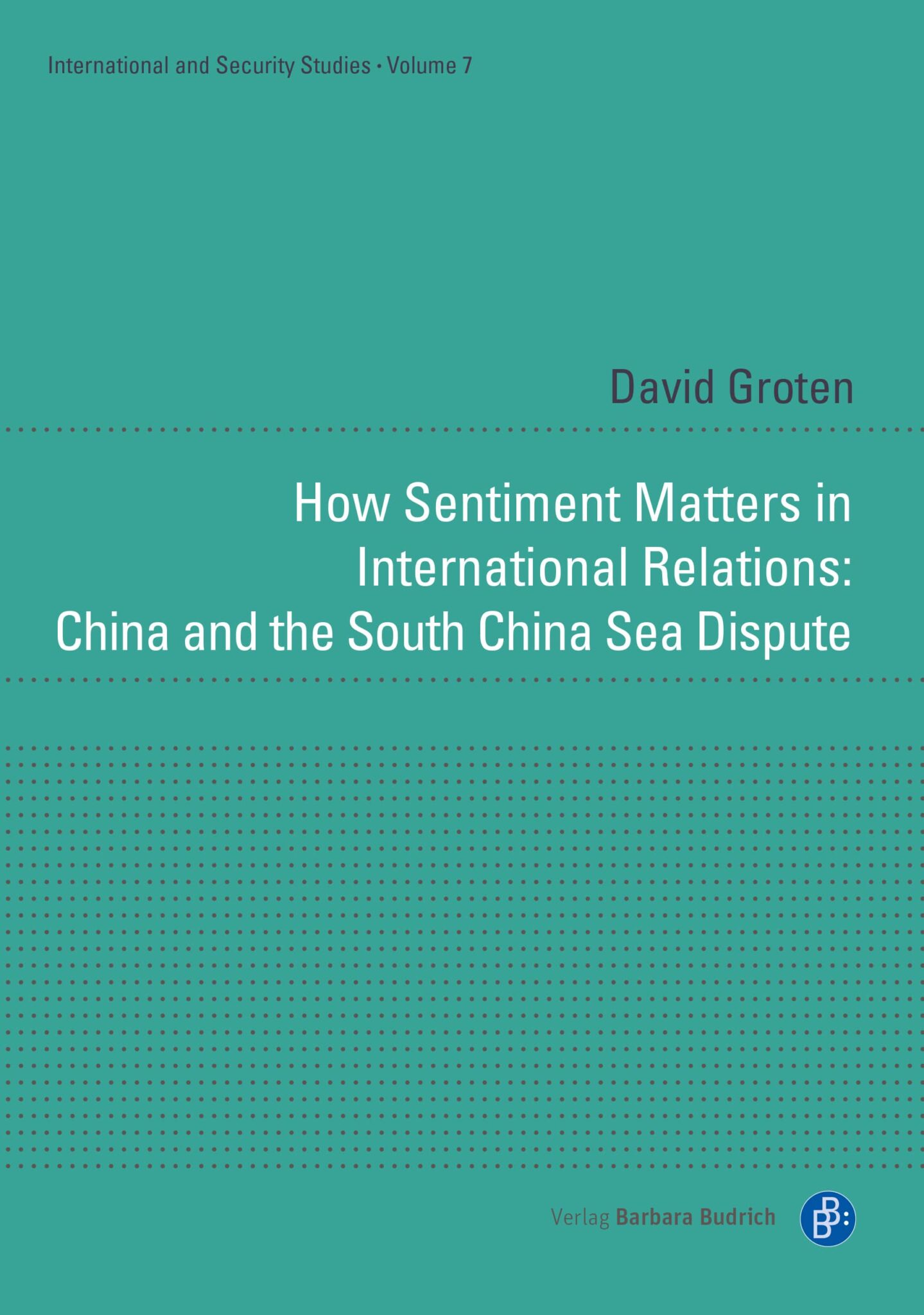Informationen zum Buch
Startseite » Programm » How Sentiment Matters in International Relations: China and the South China Sea Dispute
How Sentiment Matters in International Relations: China and the South China Sea Dispute
Erscheinungsdatum : 29.07.2019
46,99 € - 58,00 €
Beschreibung
The rise of the People‘s Republic of China represents a major challenge for global politics at large and regional stability in Southeast Asia in specific. This book reveals that growing negative sentiment and disrespect experiences perceived by the Chinese side over time have contributed to Beijing‘s increasingly bold and proactive stance toward the South China Sea Dispute in recent years. At the same time, growing regional tensions and a hardening of the stakeholders‘ positions have been the ultimate result. Based upon this book‘s findings, however, conflict is considered not inevitable and avoidable instead. To this end, a number of implications and policy recommendations are provided and critically examined.
The People’s Republic of China represents Southeast Asia’s most influential and potent actor. Its growing economic, military and political influence in this fragile, unbalanced and conflict-prone region constitutes a major challenge to future regional order, peace and stability. Tensions are particularly evident in the South China Sea (SCS). The latter is witnessing a multidimensional and tremendously complex dispute on highly sensitive issues of maritime border delimitation and territorial sovereignty. This books aims to complement existing theoretical and empirical approaches to the SCS dispute, which traditionally focus on geopolitics, security interests and economic considerations. Departing from the assumption that such variables alone are not capable of providing a comprehensive account of the increasingly entrenched situation in the SCS, let alone China’s changing stance toward it, the author argues that disrespect experiences and insufficient consideration of cognitive needs actively shape the type and scope of China’s foreign policy preferences and behavior. This approach is chosen for the purpose of gaining a more accurate understanding of China’s policy choices and preference formation processes with regard to the SCS over time as well as working out associated respect-related motives and dynamics. In order to accomplish this, an in-depth qualitative content analysis of documents published by leading Chinese foreign policy think tanks between 2010 and 2016 is conducted. The outcome of the analysis suggests that respect dynamics are both omnipresent and significant in Chinese assessments of external behavior in the SCS. It is concluded that a causal link between an increase in disrespect experienced by the Chinese side and shifts in China’s SCS policy in favor of a less cooperative and more assertive, uncompromising and more proactive approach is highly plausible. Essentially, perceived disrespect promoted empathy deficits, negative sentiments, and, ultimately, appeared to have adversely affected the PRC’s policy preferences with a direct impact on regional instability. As a result, experts and politicians are well-advised to intensify their efforts to thoroughly acknowledge the PRC’s and other SCS stakeholders‘ cognitive respect needs and resulting predicaments and dynamics if they wish to sustainably prevent conflict escalation in the SCS and to mitigate regional tensions at large.
extract
Table of Contents (pdf):
- Research Interest and Relevance
- Analytical and Theoretical Framework
- The South China Sea Dispute
- The Role of (Dis)Respect in FPTT Discourses on External Stakeholders’ SCS Conduct
- Implications & Policy Recommendations
The Author:
Dr. David Groten, Postdoctoral Research Fellow at the Helmut Schmidt University, Hamburg, Germany
Download for free: publicity leaflet (pdf)
Target groups: researchers and lecturers in political science and international relations
Zusätzliche Information
| Verlag | |
|---|---|
| ISBN | 978-3-8474-2319-5 |
| eISBN | 978-3-8474-1483-4 |
| Format | A5 |
| Umfang | 376 |
| Erscheinungsjahr | 2019 |
| Erscheinungsdatum | 29.07.2019 |
| Sprache | Englisch |
| Reihe | |
| Band | 7 |
| Auflage | 1. |
1 Bewertung für How Sentiment Matters in International Relations: China and the South China Sea Dispute
Autor*innen
Beschreibung
Beschreibung
The rise of the People‘s Republic of China represents a major challenge for global politics at large and regional stability in Southeast Asia in specific. This book reveals that growing negative sentiment and disrespect experiences perceived by the Chinese side over time have contributed to Beijing‘s increasingly bold and proactive stance toward the South China Sea Dispute in recent years. At the same time, growing regional tensions and a hardening of the stakeholders‘ positions have been the ultimate result. Based upon this book‘s findings, however, conflict is considered not inevitable and avoidable instead. To this end, a number of implications and policy recommendations are provided and critically examined.
The People’s Republic of China represents Southeast Asia’s most influential and potent actor. Its growing economic, military and political influence in this fragile, unbalanced and conflict-prone region constitutes a major challenge to future regional order, peace and stability. Tensions are particularly evident in the South China Sea (SCS). The latter is witnessing a multidimensional and tremendously complex dispute on highly sensitive issues of maritime border delimitation and territorial sovereignty. This books aims to complement existing theoretical and empirical approaches to the SCS dispute, which traditionally focus on geopolitics, security interests and economic considerations. Departing from the assumption that such variables alone are not capable of providing a comprehensive account of the increasingly entrenched situation in the SCS, let alone China’s changing stance toward it, the author argues that disrespect experiences and insufficient consideration of cognitive needs actively shape the type and scope of China’s foreign policy preferences and behavior. This approach is chosen for the purpose of gaining a more accurate understanding of China’s policy choices and preference formation processes with regard to the SCS over time as well as working out associated respect-related motives and dynamics. In order to accomplish this, an in-depth qualitative content analysis of documents published by leading Chinese foreign policy think tanks between 2010 and 2016 is conducted. The outcome of the analysis suggests that respect dynamics are both omnipresent and significant in Chinese assessments of external behavior in the SCS. It is concluded that a causal link between an increase in disrespect experienced by the Chinese side and shifts in China’s SCS policy in favor of a less cooperative and more assertive, uncompromising and more proactive approach is highly plausible. Essentially, perceived disrespect promoted empathy deficits, negative sentiments, and, ultimately, appeared to have adversely affected the PRC’s policy preferences with a direct impact on regional instability. As a result, experts and politicians are well-advised to intensify their efforts to thoroughly acknowledge the PRC’s and other SCS stakeholders‘ cognitive respect needs and resulting predicaments and dynamics if they wish to sustainably prevent conflict escalation in the SCS and to mitigate regional tensions at large.
extract
Table of Contents (pdf):
- Research Interest and Relevance
- Analytical and Theoretical Framework
- The South China Sea Dispute
- The Role of (Dis)Respect in FPTT Discourses on External Stakeholders’ SCS Conduct
- Implications & Policy Recommendations
The Author:
Dr. David Groten, Postdoctoral Research Fellow at the Helmut Schmidt University, Hamburg, Germany
Download for free: publicity leaflet (pdf)
Target groups: researchers and lecturers in political science and international relations
Bibliografie
Zusätzliche Information
| Verlag | |
|---|---|
| ISBN | 978-3-8474-2319-5 |
| eISBN | 978-3-8474-1483-4 |
| Format | A5 |
| Umfang | 376 |
| Erscheinungsjahr | 2019 |
| Erscheinungsdatum | 29.07.2019 |
| Sprache | Englisch |
| Reihe | |
| Band | 7 |
| Auflage | 1. |
Produktsicherheit
Bewertungen (1)
1 Bewertung für How Sentiment Matters in International Relations: China and the South China Sea Dispute
-
Bewertet mit 5 von 5
NF –
The book provides a straightforward and thorough analysis of China’s sentiment-inspired foreign policy in the context of the South China Sea Dispute. This sophisticated approach implies an innovative theoretical framework that builds on conceptualization and operationalization of the notion of respect in International Relations. The clearly structured analysis, the convincing theoretical approach and the sound methodological work make this book a great working tool for IR scholars interested in the broader region or researching emotional approaches in IR. The author also includes a set of interesting hands-on policy recommendations, which will be of interest to policymakers and the broader public.









NF –
The book provides a straightforward and thorough analysis of China’s sentiment-inspired foreign policy in the context of the South China Sea Dispute. This sophisticated approach implies an innovative theoretical framework that builds on conceptualization and operationalization of the notion of respect in International Relations. The clearly structured analysis, the convincing theoretical approach and the sound methodological work make this book a great working tool for IR scholars interested in the broader region or researching emotional approaches in IR. The author also includes a set of interesting hands-on policy recommendations, which will be of interest to policymakers and the broader public.